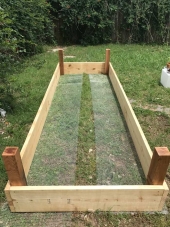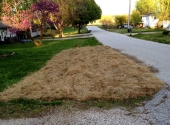
 2
2




"Consider the scrotum."
 4
4








Country oriented nerd with primary interests in alternate energy in particular solar. Dabble in gardening, trees, cob, soil building and a host of others.




Medicinal herbs, kitchen herbs, perennial edibles and berries: https://mountainherbs.net/ grown in the Blue Mountains, Australia




John Elliott wrote:May I suggest that you might be making a problem where one doesn't exist?
I know that Permies have the same relationship with Roundup that vampires do with garlic, but it doesn't need to be so. One of the saving graces of Roundup is that it does not persist long in the environment (not like, say organochlorine pesticides). The glyphosate molecule is not all that stable, and there are many pathways for it to break down, one of them being exposure to sunlight. If that load of straw was drying in a field, any glyphosate that was applied early in the growing season is probably gone from all the solar exposure.
If you get a good deal on a load of straw and are still suspicious that it might have glyphosate residues, just pile up the straw, inoculate it with fungi, and keep it watered. They will eat it for lunch and then you will have some nice mulch to work with. In fact, that's a good operating rule for all the biomass you import into your garden -- let the fungi in your garden have first crack at it before you start spreading it around. I never spread a load of wood chips as soon as it is delivered. You never know where it came from and where they have been spraying weed killers. I wait a couple months, and then, when I can dig in a few inches and see lots of white hyphae, I feel comfortable that it is ready to go to the garden.
"Consider the scrotum."




Adam Buchler wrote:
John right now the bails are sitting in a wooded area behind a friend's house down the street. They have been there a few months now. I guess I could innoculate with fungi now and then grab them in the early spring for mulch.....they cost me 42$. I'm assuming I can find fungi in those woods to innoculate the straw with. What is the best way to go about doing that....how do I know what type of fungi I'm looking for?








Matu Collins wrote:I can't wrap my mind around why they would spray round up on the grass to kill it. Cutting it for straw will kill it, right? And chemicals cost money, right? Now I'm paranoid about the straw I've been getting. I know the farmer who grows it. I get it from him because he's very local, but he has not proven himself to be trustworthy especially when it comes to chemicals. Don't tell me I've been using roundup fungicide straw...
I talk about some of my experience with this farmer in this thread




For unlimited return on all your investments - Make your deposits at 'The Entangled Bank' !




Matu Collins wrote:I can't wrap my mind around why they would spray round up on the grass to kill it. Cutting it for straw will kill it, right? And chemicals cost money, right? Now I'm paranoid about the straw I've been getting. I know the farmer who grows it. I get it from him because he's very local, but he has not proven himself to be trustworthy especially when it comes to chemicals. Don't tell me I've been using roundup fungicide straw...
My understanding is that farmers spray Roundup on wheat just a few days before harvest to kill the plant so the seeds dry uniformly. The cash crop is the wheat, not the straw. If they don't use Roundup as a desiccant, they probably use something much worse, unless they are organic wheat growers.
As has already been mentioned, Roundup isn't a persistent herbicide, and it dissipates pretty fast. I'm personally not as concerned about using the wheat straw in the garden, though I would prefer and pay more for organic straw if I could find it. I'm more concerned that they spray the grain just before harvesting it. Is it any wonder that we have measurable levels of glyphosate in our food supply?
If you buy straw from a farmer, ask if he used a desiccant to dry the wheat, and if so, what did he use.

 9
9




One of the saving graces of Roundup is that it does not persist long in the environment (not like, say organochlorine pesticides). The glyphosate molecule is not all that stable, and there are many pathways for it to break down, one of them being exposure to sunlight. If that load of straw was drying in a field, any glyphosate that was applied early in the growing season is probably gone from all the solar exposure.
List of Bryant RedHawk's Epic Soil Series Threads We love visitors, that's why we live in a secluded cabin deep in the woods. "Buzzard's Roost (Asnikiye Heca) Farm." Promoting permaculture to save our planet.





"Never doubt that a small group of thoughtful, committed citizens can change the world; indeed, it's the only thing that ever has."-Margaret Mead "The only thing worse than being blind, is having sight but no vision."-Helen Keller












 3
3




List of Bryant RedHawk's Epic Soil Series Threads We love visitors, that's why we live in a secluded cabin deep in the woods. "Buzzard's Roost (Asnikiye Heca) Farm." Promoting permaculture to save our planet.
 1
1








sortof-almost-off-grid in South Africa: https://www.instagram.com/heartandsoilnoordhoek/

 1
1








 1
1





|
Tomorrow is the first day of the new metric calendar. Comfort me tiny ad:
Learn Permaculture through a little hard work
https://wheaton-labs.com/bootcamp
|


